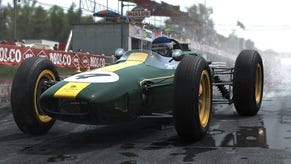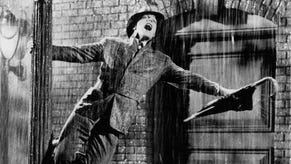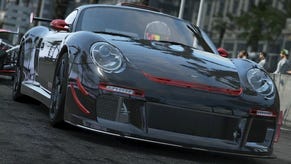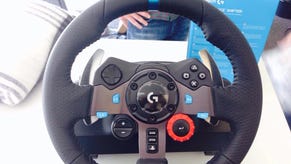Project Cars is already a better racing game than Forza or Gran Turismo
But is that enough for it to compete?
Slightly Mad Studios is in fighting mood. There's a slight cockiness to creative director Andy Tudor as he runs through the crowd-funded, crowd-developed game, taking an assembled audience at Brands Hatch through everything that will make Project Cars stand out, and how it's out to compete against the big hitters, against Gran Turismo and Forza. There's an admirable, tenacious bite to the demeanour, too - I can't help but think of iconic images of a sprightly Lotus Cortina snapping at the heels of the wallowing Ford Galaxie in 60s saloon racing.
Without the backing of a platform holder, or a big, established brand of its own, Project Cars is going to need all the fight that Slightly Mad Studios can muster. "Obviously we're up against it, but I think we've got that bulldog mentality, and people root for the underdog," Tudor tells us after the presentation about Project Cars' prospects against well-established competition. "I think it's pretty bold to say that we're trying to beat Forza and Gran Turismo - I hope people at least put them in the same category, and see us as an alternative."
The wind is blowing in Project Cars' direction, at the very least. There are plenty of racing games coming out before Christmas - the open-world American epic The Crew, the extremely polished Xbox One exclusive Forza Horizon 2 and Sony's own dazzling DriveClub - but, in the absence of mainline Forza and Gran Turismo entries, Project Cars stands alone in its intentions.
"If you are looking for something with cars that are realistic, with tracks and with features that you wished had been in Forza and Gran Turismo for many years, with no tire squeal like there is in Gran Turismo, cars that don't go round in a funeral procession like Forza, then Project Cars is the one for you," says Tudor, before resorting to humility for a brief second. "But to even be compared to them is honour enough."
There's more to Project Cars than chutzpah, though, and Slightly Mad aren't exactly plucky young upstarts. The studio's history is long and distinguished, stretching back to its former life as Blimey! Games and the incredible GTR games and going all the way to 2011's Shift 2 Unleashed, a game that was sensational in its treatment of racing. It was sensational to a fault, unfortunately, with a handling model that erred towards the erratic in its quest for drama.
You'll see glimpses of those games in Project Cars, though thankfully it's the best of both series that's shining through right now. The spectacle of Shift is retained in the returning helmet cam, as good an approximation you'll get of the experience of being buffeted about in the cockpit of a car without resorting to the real deal or an Oculus or Morpheus headset (both of which are also being supported). It's glorious looking, even if some of that splendour has been dialled down for the PlayStation 4 version - the sun sets over freshly damped tracks, lighting the little pools of water that can catch you off guard as you lap the laser-scanned circuits.
It's the similarities between Project Cars and GTR that are most exciting, especially if, like me, you rate the ageing PC series as the very pinnacle of the racing genre. At a time when we're spoilt for driving games, you may think it odd to bemoan the lack of half decent racing action in the genre, but it's been an age since I've had a certain itch scratched: the one that comes from spending countless Sundays devouring any motor race available online or on TV.
So why do I still go back to 2006's GTR 2 to get an approximation of that which I love dearest? Maybe it's because most driving games haven't cottoned on to the fact that I'm not after a tailored narrative, tied together with an over-enthusiastic voiceover. There's a time and a place for an in-depth levelling RPG levelling system, and out on the tarmac between the green light and checkered flag most certainly isn't it. All I ever want is a field of licensed cars, a series of simulated races and a points table tying it all together. It's a neat piece of design that's endured for decades in the real world of racing, and I can't see it being trumped any time soon.
So what's exciting about Project Cars, more than its widely celebrated visuals or its attention to detail, is its faith in what makes motorsport tick. What makes it stand out is its willingness to sidestep experience or reward systems in favour of just giving you every car from the off, and allowing you to race them as you please in a series of championships. It's simple stuff, but thrillingly so.
"Other games you may have to grind for XP to unlock them, or you may even - god forbid - have to buy them via micro transaction," says Tudor. "You may have to grind for cash in races to buy the car that you want. We've scrapped that. It's a broken model. You start thinking about money, and your account balance as opposed to things that real racing drivers think about which is their career, the points in the championship, how good the car is feeling, improving the car."
The feel of the cars has improved, thankfully, after the somewhat wayward efforts in Slightly Mad's last game. "At the end of Shift 2 Unleashed we were looking on all the forums, Reddit, NoGripRacing, GTPlanet, and we were looking at the big concerns," says Tudor. "It was input lag, handling, how the feedback doesn't feel right on the wheel. Day one we were like, what the hell, we've got to fix that. There was a lot of rewriting, we've got a brand new tire model. It's super-important. The tire model is the physics that drive the thing that's most in contact between the car and the track. It's super-important - it drives everything. It drives the handling, the grip levels, the temperatures, when you're swapping tires, how the rain effects things."
In practice, Project Cars strikes a balance somewhere between the exacting simulation of rFactor and more accessible console fare - the closest match, in fact, would be Forza itself. There's a lightness of touch to the cars, an ability to hurl them round with some abandon without serious consequences while a sense of simulation is maintained. The diversity of Project Cars garage makes for diverse handling experiences, though the quality isn't necessarily consistent right now - a Formula Ford inspired single seater feels deliciously light as it dances in the rain of the Hockenheimring, while a Z4 GT around Oulton Park displays some of the skittishness that blighted Shift 2 Unleashed.
Work is still to be done in the coming months, and there's no doubting Project Cars' authenticity. The brilliantly named, exceptionally talented German GT driver Rene Rast has been using the game as an aid before big endurance races this year, preparing for Le Mans and Nurburgring by taking to his own rig. Even more impressively, it's something he did without provocation from Slightly Mad Studios - Rast, as an enthusiast of driving games, picked up an early build of Project Cars of his own accord.
It tells of the enthusiasm that's swelled around Project Cars since its release, the waves of excitement that have met each exquisite looking, fan-made trailer. The crowd development model has helped Project Cars establish a community before it's even launched, and some of that enthusiasm has now started to bleed out elsewhere. Can it genuinely square up against the likes of Gran Turismo and Forza? With its features, its momentum and its appetite and understanding of what makes motorsport tick, there's every reason to believe it could be the game that reminds the old guard what makes racing so special.











